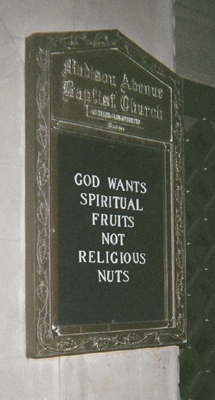American Christianity: An Oxymoron?

It is very difficult for me to write about something that hasn't taught me something. To learn something new is to reconfigure the brain, if only slightly, and for me there is something about the process that creates a compulsion to write. No such compulsion was born of reading Bill McKibben's piece, in Harper's, "The Christian Paradox." Sure, there were a few little things that I learned from it, such as the dandy finding that
Only 40 percent of Americans can name more than four of the Ten Commandments, and a scant half can cite any of the four authors of the the Gospels. Twelve percent believe Joan of Arc was Noah's wife. [!!!!!]
That's how the essay begins. What immediately follows was not new.
This failure to recall the specifics of our Christian heritage doesn't matter all that much in spiritual or political terms. Here is a statistic that does matter: Three quarters of Americans believe the Bible teaches that "God helps those who help themselves." That is, three out of four Americans believe that this uber-American idea, a notion at the core of our current individualist politics and culture, which was in fact uttered by Ben Franklin, actually appears in Holy Scripture. The thing is, not only is Franklin's wisdom not biblical; it's counter-biblical. Few ideas could be further from the gospel message, with its radical summons to love of neighbor. On this essential matter, most Americans - most American Christians - are simply wrong, as if 75 percent of American scientists believed that Newton proved gravity causes apples to fly up.
What has happened in this country of ours, with its resistance to authority of any kind, is that most Americans have infected true Christianity with a metastasizing agent that produces a religion of accommodation. It is a Wicked Queen's mirror of a religion, assuring its followers that they're doing fine, and that Jesus loves them, no matter what.
Well, not quite "no matter what."
Continue reading about "The Christian Paradox" at Portico.


Comments
There’s been quite a bit of noise recently concerning Christianity’s most distinguishing and identifying message. It is not to be disputed that Christ enjoined his followers to love their neighbors, to care for the poor and ill amongst them, and to forgive others’ trespasses. While I thoroughly applaud Christ’s ultimate message, I can not help but think that the tension between McKibben’s Christianity and James Dobson’s is not easily dissolved by pointing to a few wise phrases in scripture. I believe that this tension lies in the scripture itself, that body of massive contradictions. It preaches a manic gospel of damnation and rapture, all the while entreating us to forgive one another. What place should such a tradition enjoy in public life? This tome of 66 parts has justified and sustained innumerable injustices, and we continue to argue about its actual injunctions. In a way, it may be helpful to show the right (many of whom identify as Christians) where they have erred. However, I am led to pose the following question: can’t we find another book?
Posted by: EJ | August 10, 2005 09:13 PM
I ought to have made more of point that Jesus emphatically announced that his teachings replaced the old law. But the disciples were uncomfortable with this clean break, which meant losing the sympathies of other Jews; it would not be for a generation or so that gentiles would figure in the picture. By then, the “thus He fulfilled the Scriptures” stuff had been worked out. It would be taken up by the church fathers, who were terribly drawn to the dark majesty of the Old Testament.
Jesus, in short, never stood a chance.
Posted by: R J Keefe | August 10, 2005 09:17 PM